Shunned, abused, murdered. For many LGBT asylum seekers in Turkey and Greece, every day is a struggle for survival.
Sandy knew right away the customer was dangerous. Most men who cruise Istanbul’s Taksim Square looking for sex tend to move around nervously or feign nonchalance. But this man had menace in his eyes. “From his style, you could tell he had no money,” she recalled. “We warned her not to go with him. He looked suspicious. But she didn’t listen. She needed the cash.” Sandy was standing in the same place in Taksim Square where she had watched her friend, Warda, follow the Turkish man into the Saturday night crowd six months earlier, on December 17, 2016. It was the last time she saw her alive.
Like Sandy, Warda was a transgender refugee from Syria. Both had fled war and persecution in search of a safe haven in Europe. They made it to Istanbul where, ostracised by locals and other refugees alike, they had to sell sex to survive. “Three hours later we called her on her phone, but it was off,” Sandy said through tears, mascara running down her face. “So I went back home and found her covered in blood. I could barely recognise her.” Sandy showed a picture of the murder scene on her cell phone. Warda was slumped on the floor with a huge gash in her side and lower back. The murderer had disembowelled her, slashed her throat and cut off her genitals. “Eventually, the police came and took her body,” Sandy said. “We wanted to give her a proper funeral, but they wouldn’t let us. She was buried like a dog.”Warda was 30, the same age as Sandy. Her final resting place is a cemetery on the eastern outskirts of Istanbul where wildflowers grow by her unmarked grave. When Sandy contacted Warda’s relatives in Syria after her death, they said she had brought shame on the family. They did not allow the cemetery to put up a headstone.
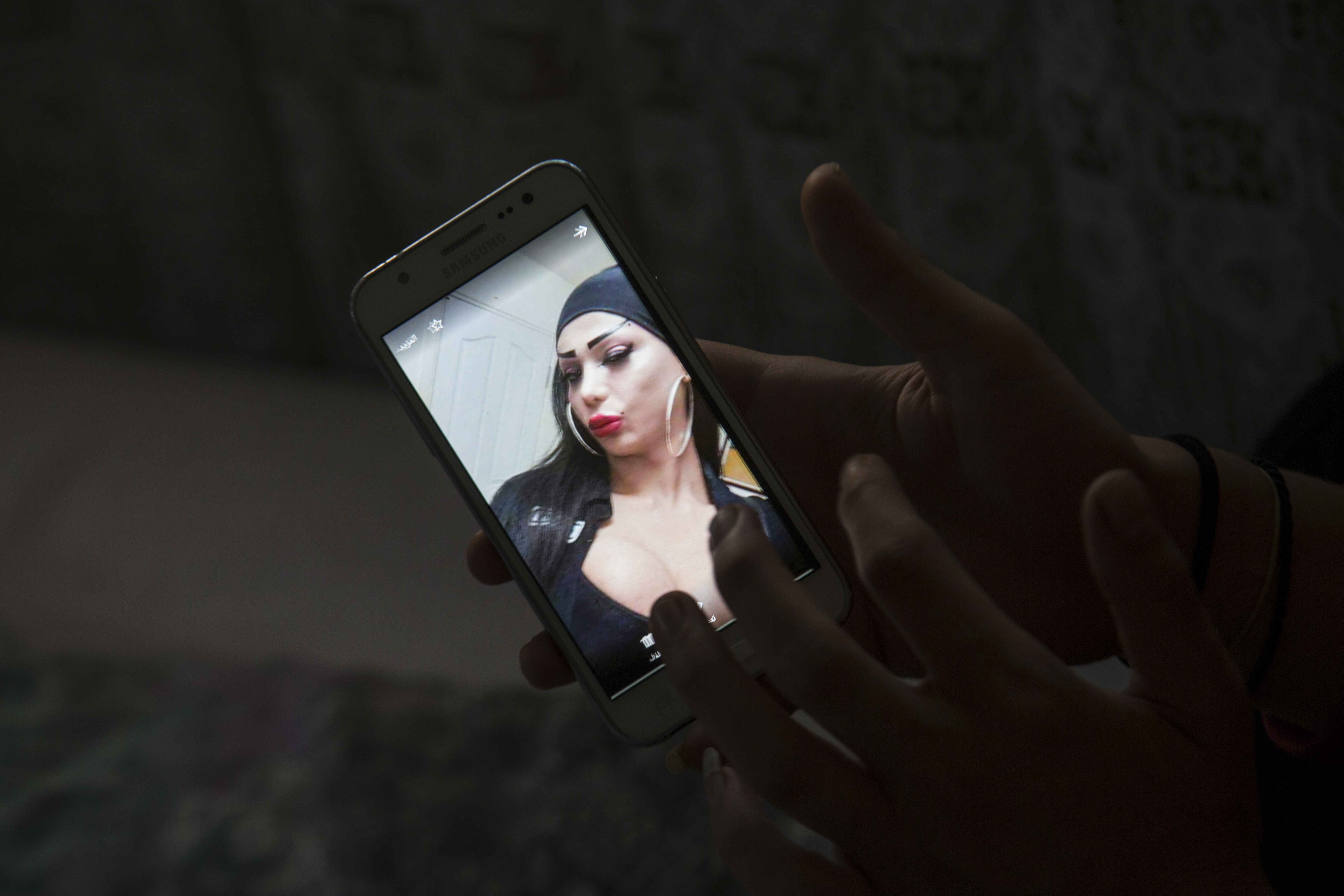
Warda, seen in a snapshot on a friend’s cell phone, was murdered in Istanbul on December 17, 2016. © Alexia Tsagkari
Warda, seen in a snapshot on a friend’s cell phone, was murdered in Istanbul on December 17, 2016.
Photo: © Alexia Tsagkari
Police never caught the killer and the murder went largely unnoticed in Turkey, where rights activists say hate crimes are increasingly common against members of the lesbian, gay, bisexual and transgender, LGBT, community. For some LGBT refugees in Istanbul, it sealed their decision to try to get to Western Europe by any means.
Over the summer and autumn of 2017, we tracked the progress of LGBT refugees intent on travelling from Turkey to Greece and then on to countries further north. With the closure of well-trodden refugee routes following an EU-Turkish deal to stem the flow of people into Europe, they had to pay smugglers for passage. What unfolded was a drama of fear and dashed hopes as the dream of a better life melted into a nightmare of violence and discrimination. Their stories highlight the psychological and physical traumas facing many LGBT refugees as stigma and persecution follow them on their quest to find asylum. They also underline the failure of host countries and the humanitarian system to protect some of the most vulnerable among the biggest movement of displaced people across Europe since World War II. All the LGBT refugees interviewed for this story wished to be identified by their chosen first names due to safety concerns.
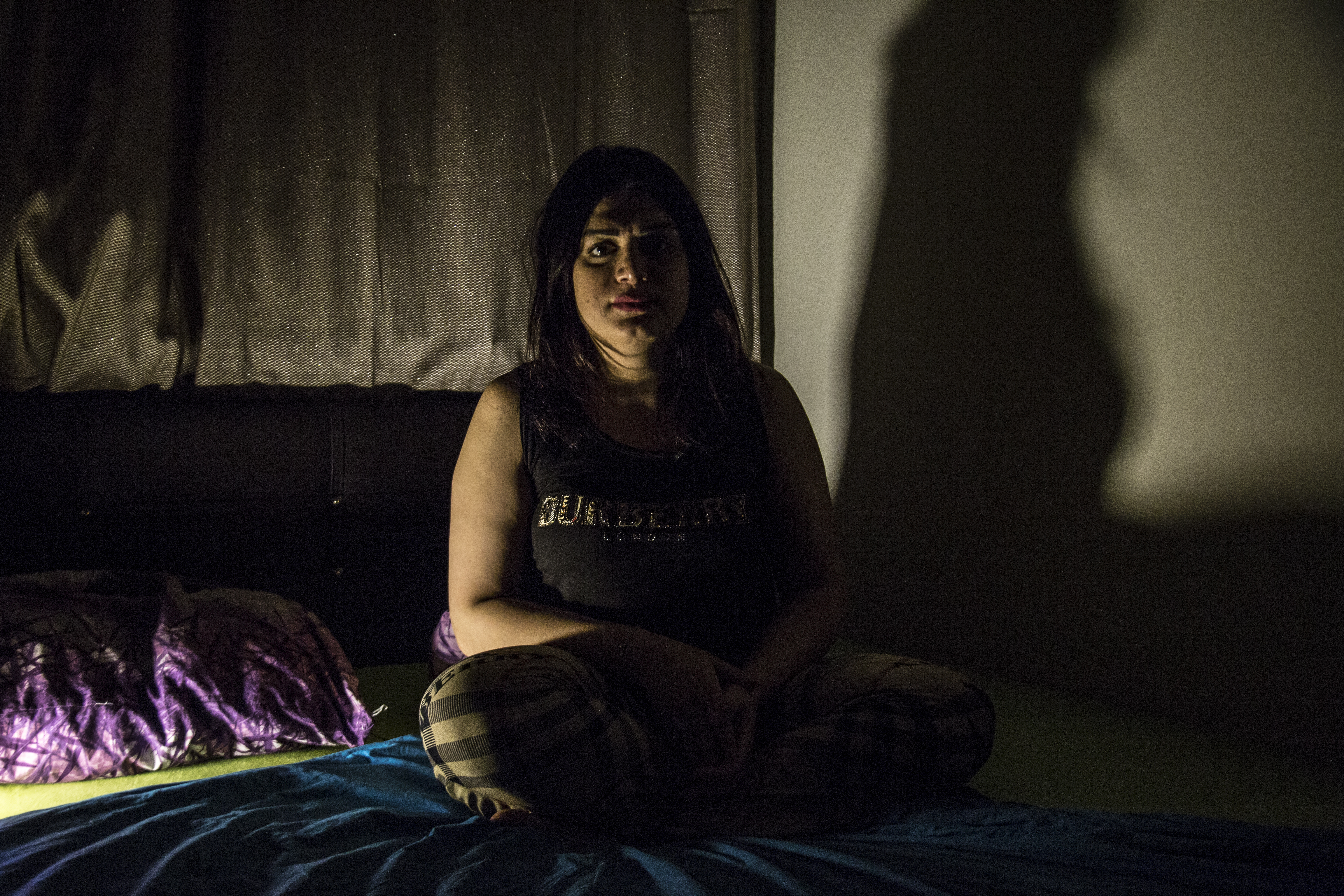
Sandy, a 30-year-old transgender refugee from Syria, says her murdered friend was ‘buried like a dog’. © Alexia Tsagkari
Sandy, a 30-year-old transgender refugee from Syria, says her murdered friend was ‘buried like a dog’.
Photo: © Alexia Tsagkari
Hate crimes
The 1951 UN Refugee Convention, which obliges countries to protect people fleeing from danger, defines a refugee as someone with a “well-founded fear of being persecuted for reasons of race, religion, nationality, political opinion, or membership of a particular social group”. While the convention does not specifically refer to LGBT people, an EU directive in 2011 spelled out that persecution for sexual orientation or gender identity is solid grounds for asylum.
No one knows how many LGBT people are among the millions who have fled conflict, poverty and persecution in the Middle East, North Africa and South Asia over recent years, with many hoping to reach northern Europe. Since 2015, some 2.9 million people have applied for asylum in EU countries, according to the EU Commission’s statistics office. Only Belgium collects data on LGBT asylum applications, though its latest figures are limited to 2008-2012. During that period, 4.4 per cent of cases were based on sexual orientation or gender identity. Meanwhile, some 3.4 million people are knocking on Europe’s door in Turkey, host to the world’s largest refugee population, according to the UN Refugee Agency, UNHCR. Ramtin, a 27-year-old gay man from Iran, is one of them. At around noon on June 25, 2017, he was standing on one side of Taksim Square as activists gathered on the other to defy a ban on the annual LGBT pride parade. It was the third year in a row the city governor’s office had banned the rally, citing public safety after threats from extremist groups.
“They laughed at me and told me I got what I deserved for being a faggot”
A little more than a year after a failed military coup prompted the government to declare a state of emergency — which critics say it has used to cement authoritarian rule and crush dissent — police were in no mood for games. Ramtin watched in terror as more than 30 police buses, truck-mounted water cannons and tanks blocked all passages leading to Istiklal Avenue, a pedestrian street off Taksim Square that is normally swarming with locals and tourists. His instincts were to join the protesters — but the stakes were high. Arrest could mean deportation to Iran, where a local court had sentenced him to death in 2015 for engaging in “unnatural relations”. It was thanks to a relative, who bribed the prison guards in his village, that he managed to escape and flee to Turkey, he said.
Amnesty International estimates that 5,000 gay men and lesbians have been executed in Iran since the country’s 1979 revolution. As anti-riot police began firing tear gas and rubber bullets, sending demonstrators sprinting across the square, Ramtin made up his mind and ran to safety in a café nearby.
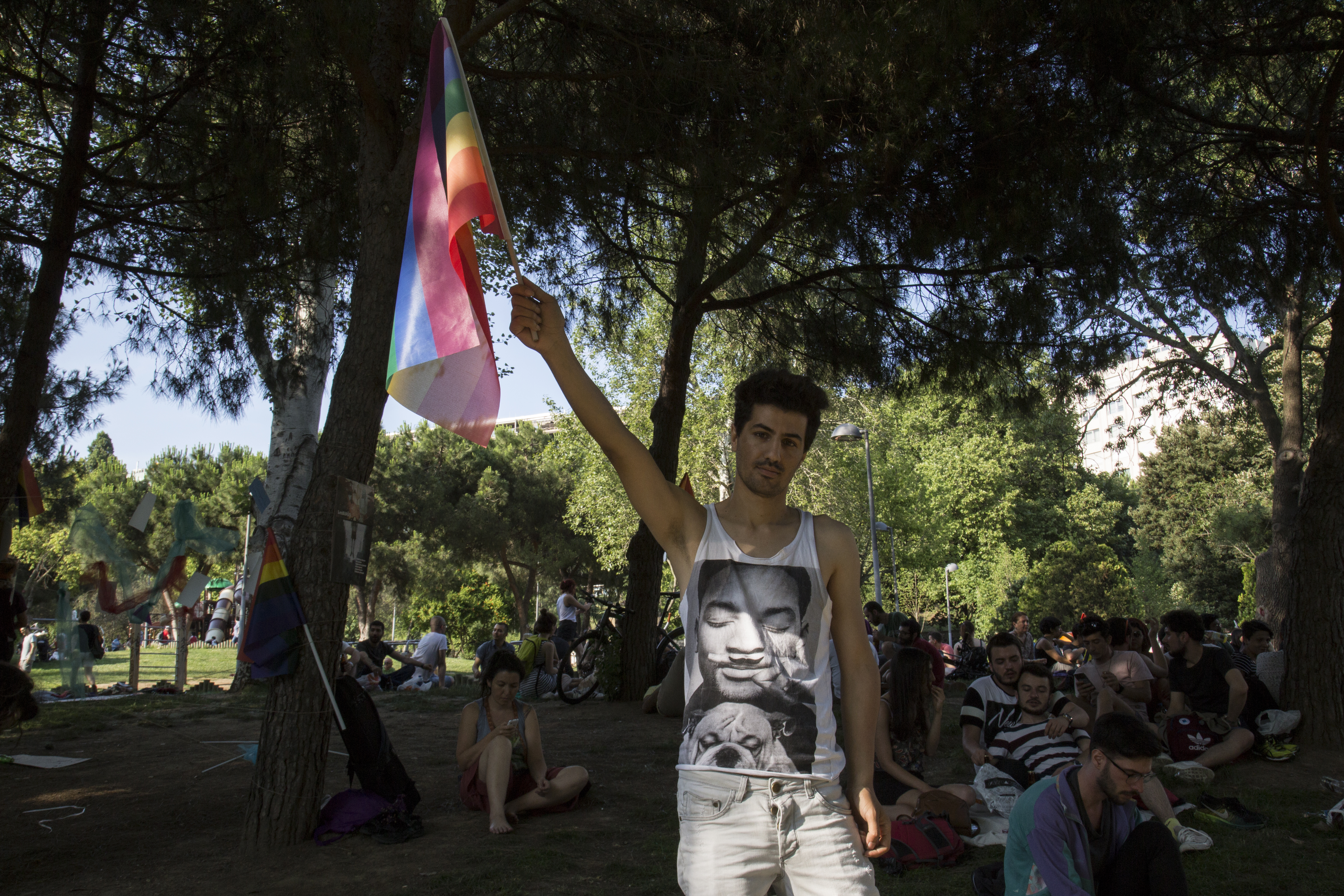
Ramtin, a gay refugee from Iran, waves an LGBT flag at a park in Istanbul. Photo: © Alexia Tsagkari
Since arriving in Turkey, Ramtin says he has been mugged, raped and threatened with death by locals and other Iranian refugees. When he reported the crimes, police mocked him. “They laughed at me and told me I got what I deserved for being a faggot,” he said. On paper, Turkey has a long history of tolerating homosexuality, which has been legal since the republic was founded in 1923. But growing homophobia in an increasingly reactionary and anti-secular climate makes the country anything but a sanctuary for LGBT asylum seekers, rights groups say. In November, Turkish President Recep Tayyip said that empowering LGBT people was “against the values of our nation”. A week later, the governor’s office of Ankara banned all LGBT cultural events in the city.
Yildiz Tar, a spokesman for the Kaos Gay and Lesbian Cultural Research and Solidarity Association, an Ankara-based rights group, said such moves helped inflame smouldering homophobia and transphobia. “There’s a huge amount of hate crime going on, though we don’t have exact numbers since the government doesn’t collect any statistics,” he said, sitting on some stairs in a secluded alley in central Istanbul. Tar cited the case of Muhammed Wisam Sankari, a gay Syrian refugee who in 2016 was beheaded and so brutally mutilated in Istanbul that his friends could only identify him by his trousers. Sankari had told police he was in danger after being abducted five months earlier and taken to a forest where he was raped and tortured by unknown assailants. No one has been brought to justice for either attack, Tar said. It was not possible to put questions to police in Istanbul. The Turkish embassy in Athens declined to comment on the Sankari case and other matters, including questions about LGBT rights in the country of 80 million people.
“There’s a huge amount of hate crime going on”
Tar said LGBT exiles from some countries, notably Iran, can count on well-established support networks to help them make ends meet and navigate the lengthy asylum process. “They declare their gender identity and ask for international protection,” he said. “This process can take years and since they have problems accessing services, nearly all of them have suffered physical or verbal violence.”
Meanwhile, LGBT refugees from Syria are often completely on their own, Tar said. Syrians make up 90 per cent of Turkey’s refugee population — some 3.1 million people, according to the latest UNHCR figures. Syrian law criminalises “unnatural sexual intercourse” with up to three years in prison, and countless LGBT people have been tortured and killed in areas controlled by Islamic State fighters, rights groups say.
Since 2011, the International Lesbian, Gay, Bisexual, Trans and Intersex Association, an alliance of rights groups, has declared Syria the world’s most dangerous country to be LGBT. “With Syrian refugees, the problem is them coming out, saying who they are,” Tar said. “Hence, they are not recorded as LGBT refugees and their special needs are ignored.” According to a UNHCR report published in 2015, LGBT refugees who remain under the radar risk “severe social exclusion and violence in countries of asylum by both the host community and the broader asylum-seeker and refugee community”.
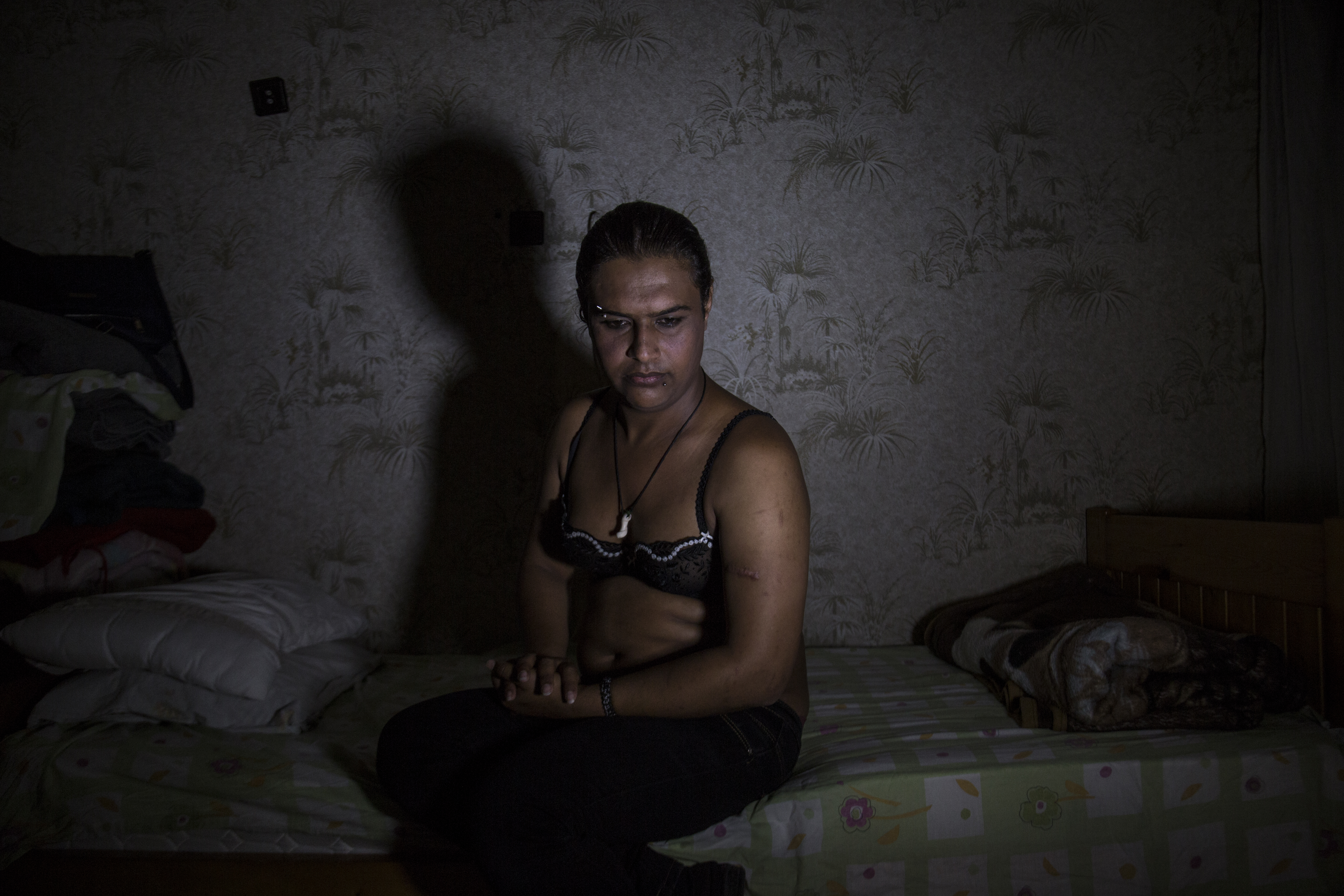
Maher, a 23-year-old transgender refugee from Iraq, fled to Istanbul after she was charged with committing ‘unnatural acts’. © Alexia Tsagkari
Maher, a 23-year-old transgender refugee from Iraq, fled to Istanbul after she was charged with committing ‘unnatural acts’.
Photo: © Alexia Tsagkari
“No paradise”
For Maher, a 23-year-old Iraqi transgender woman, Warda’s murder was the final straw. Back home in Iraq, Maher had led a double life. At the police station where she worked as an administrator, colleagues thought of her as one of the guys. But that all changed when she left her phone at the office one day. It contained pictures of her wearing a long black wig and women’s clothes. Colleagues who saw the photos had her arrested. She was charged with committing “unnatural acts”, tortured and imprisoned, she said. After three-and-a-half months, she was released on the condition that her brother act as guarantor while she awaited trial. When she fled the country several months later, her brother was arrested and sentenced to life imprisonment — a fact that she says weighs on her every day.
A month before Warda was murdered in Istanbul, Maher saw another transgender sex worker killed in Taksim Square. Maher was standing in the square with her friend, Hassan, a gay refugee from Syria, when a group of men began harassing the sex worker. “Hassan wanted to go and protect the trans,” she said. “She wasn’t our friend, but we knew her at the square. I was really afraid these people were going to attack us so I pushed Hassan away. After a while, the men cut her throat with a knife.”
Between 2008 and 2016, 43 transgender people were murdered in Turkey, according to a 2016 report by rights group Transgender Europe, though it said the number was just the “tip of the iceberg”.
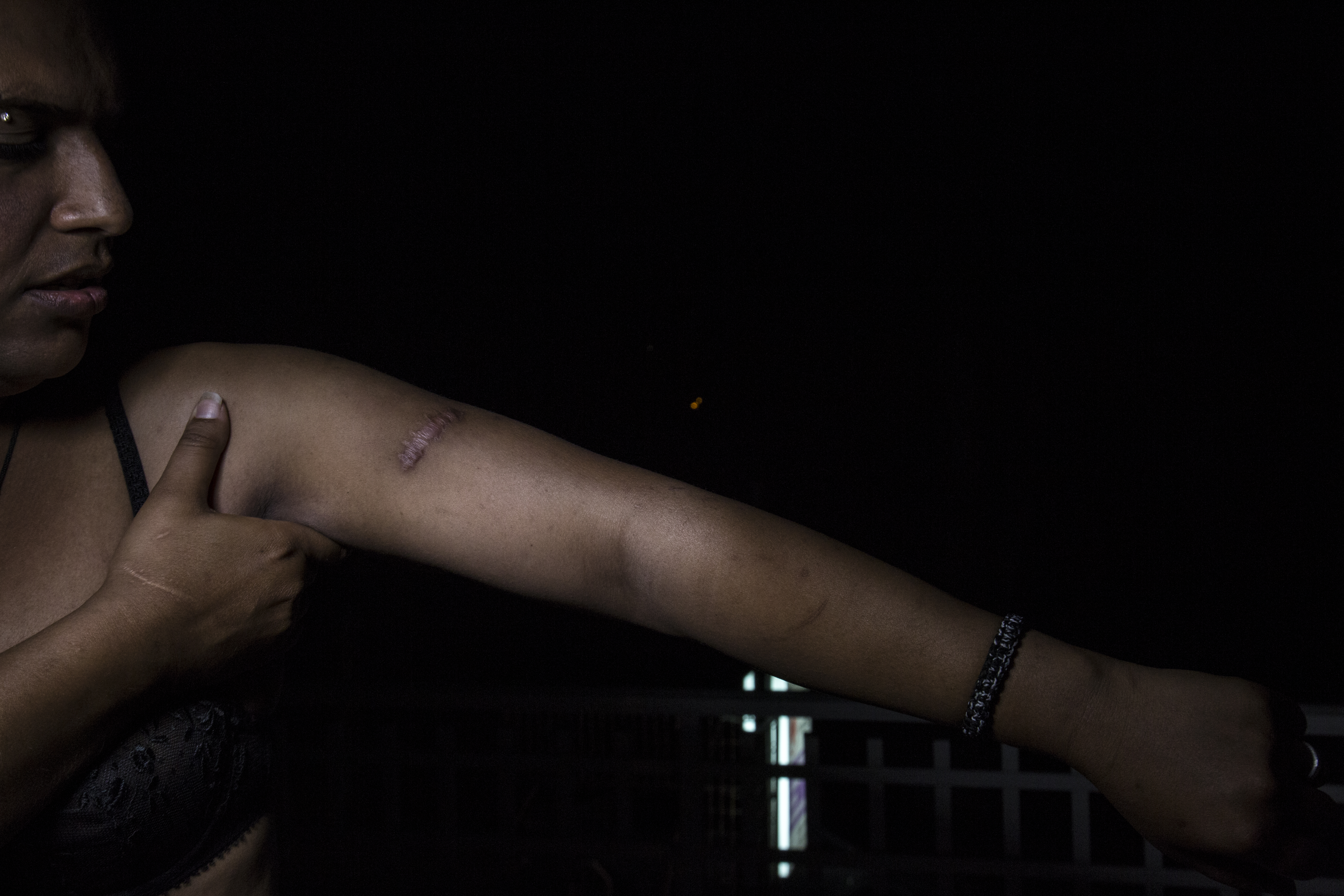
Maher shows scars that she says prove she was tortured by police in Iraq. © Alexia Tsagkari
Maher shows scars that she says prove she was tortured by police in Iraq.
Photo: © Alexia Tsagkari
Shaken by the violence around them, Maher and three close refugee friends, including Hassan, resolved to try to get to the Netherlands, which they saw as a kind of promised land. Hassan, who was a hairdresser in Aleppo in Syria and sports bleached blonde hair, dreams of opening his own salon in Amsterdam.
Sandy, the 30-year-old transgender refugee from Syria who found Warda’s body, decided not to go with them. She knew Amsterdam well, having lived there for seven months after paying a smuggler to fly her there on false documents in 2013. She was deported back to Turkey after being caught as an illegal immigrant. “I have a boyfriend here, and a life rebuilt during the last four-and-a-half years,” said Sandy, who had recently undergone sex reassignment surgery by a backstreet doctor in Istanbul. “Amsterdam is not a paradise for us either.”
“The men cut her throat with a knife”
Around 2,000 kilometres away in Amsterdam, some LGBT asylum seekers share Sandy’s disillusionment in a country once hailed as a beacon of tolerance. In 2017, an Amsterdam-based charity called LGBT Asylum Support helped around 100 LGBT refugees with their asylum claims. The organisation says dozens were rejected, with authorities increasingly reluctant to give applicants the benefit of the doubt. “People think they have come to a safe place, but instead they live in a nightmare,” Sandro Kortekaas, the charity’s chairman, told us in a Skype interview. “The system even doubts that they are gay. How a refugee can go back to a war [zone] or to a place where he will face death?”
Johannes Lukas Gartner, programme director of human rights group Humanity in Action in Berlin, summed up the predicament of many LGBT refugees in a recent essay. “To be granted asylum, queer refugees need to prove to immigration authorities and judiciaries that they are queer, that they fear persecution on the grounds of their sexuality, and that such fear is well-founded,” he wrote. “Even more than in cases of political, religious or ethnic persecution, however, the outcome of their claims is largely dependent on the existence of usually non-existent evidence.”
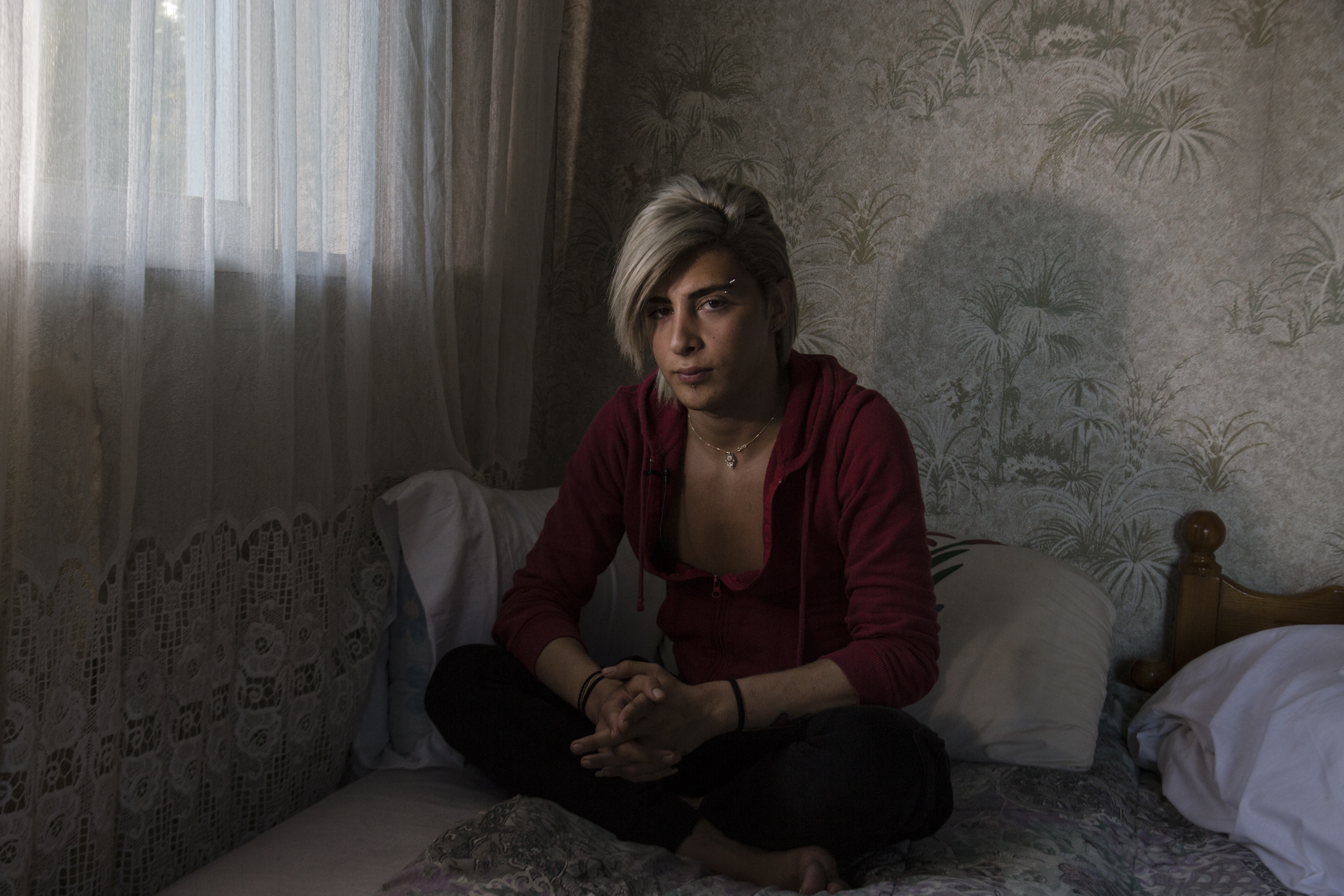
Hassan, a gay refugee from Syria, dreams of opening his own salon in Amsterdam. © Alexia Tsagkari
Hassan, a gay refugee from Syria, dreams of opening his own salon in Amsterdam.
Photo: © Alexia Tsagkari
Undeterred, Maher and Hassan set off for Greece in January 2017, along with Hassan’s Iraqi boyfriend, Mahdi, and Lara, a transgender woman from Syria. They paid a smuggler 800 euros each to take them in a dinghy from the eastern port of Bodrum to the Greek island of Leros, 80 kilometres from the Turkish mainland. Their journey was in defiance of a 2016 deal between the EU and Ankara requiring Turkey to stop illegal crossings to Greece in exchange for financial aid and faster EU membership talks. The agreement all but closed the Aegean Sea route. In 2015, an average of 6,828 people a day crossed to Greece from Turkey. By December 2016, the number had fallen to 54 per day, according to UNHCR.
As Balkan countries to the north also closed their borders, many refugees and migrants found themselves stranded in camps and urban centres across Greece. As of late-November, almost 15,500 people were stranded on islands in the eastern Aegean hoping to be transferred to the Greek mainland. Those whose asylum claims are rejected will be deported — to Turkey if they registered there en route to Greece, otherwise to their home countries.
Once on Leros, Maher, Hassan, Mahdi and Lara registered at a camp on Lakki Bay comprised of dozens of converted shipping containers on the grounds of a psychiatric hospital. They said the threat of violence was constant, from both camp-dwellers and locals on the island of 8,000. In May, a group of men stabbed Lara as she was wandering across the island’s main street. “I heard somebody shouting behind me in Greek,” said the 28-year-old transgender woman from Homs in Syria. “Before I could turn my head, I felt a sharp pain in my back and fell on my chest. I think that saved my life.” Asked about alleged attacks on LGBT refugees, some Greek locals said they had it coming. “They’re going to make our sons sissies and faggots,” said Yiannis Koumoulis, the owner of a car rental shop.
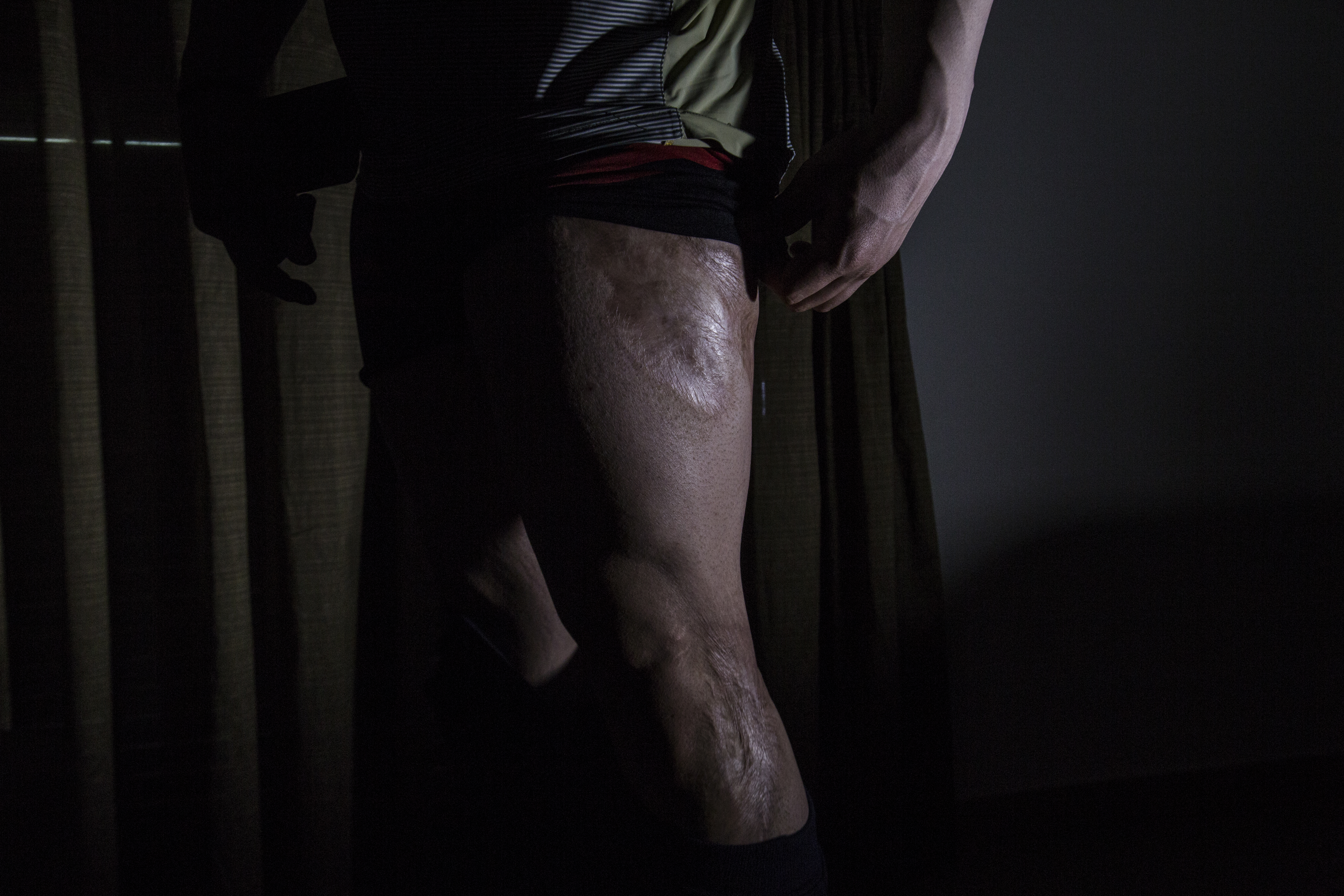
Bassim, a gay refugee from Iraq, shows scars from when his own brother tried to burn him alive. © Alexia Tsagkari
Bassim, a gay refugee from Iraq, shows scars from when his own brother tried to burn him alive.
Photo: © Alexia Tsagkari
Greek Gateway to Europe
In 2015, bankrupt Greece became known as the gateway to Europe as more than a million refugees and migrants travelled there via Turkey before heading on to other destinations in Western Europe. In response to the biggest movement of displaced people since World War II, the European Union signed a deal with Turkey in March 2016 to keep people from crossing to Greece in exchange for financial aid and faster EU accession talks. Under the deal, Brussels and Ankara agreed that all new “irregular migrants and asylum seekers” crossing to Greek islands as of March 20, 2016 would be returned to Turkey. Meanwhile, for every Syrian returned to Turkey from the Greek islands, another Syrian would be resettled to the European Union.
And finally, Turkey would take all necessary steps to prevent new sea or land routes to the EU from opening up.
In March 2016, Macedonia, Croatia and Slovenia shut their borders, leaving tens of thousands of refugees and migrants stranded in Greece.
Breaking point
Across the Aegean, LGBT refugees find themselves in equally precarious environments. “LGBT refugees need additional protection, since they’re subjected to different forms of violence and exclusion from access to basic services,” said Margarita Kontomichali, coordinator of a support programme for LGBT asylum seekers run by an Athens-based charity called SolidarityNow. On the tiny island of Kos, two hours from Leros by ferry, gay asylum seekers sheltering in an abandoned hotel said they were haunted by the fear of deportation. “I tried to kill myself twice in the camp,” said Bassim, a 31-year-old man who fled Iraq after his extremist brother tried to murder him. “I was too much of a coward to finish myself off.” He choked back tears as he showed the scars on his left thigh from the night in 2016 when his brother burst into his room, poured oil on him and set his leg alight. “My brother is still looking for me. But here in Greece, I don’t feel safe either.”
LGBT refugees say some local aid workers lack the training and awareness to deal with sensitive cases, while others are downright homophobic. An 18-year-old Syrian gay man who declined to be identified described his frustrations dealing with the asylum procedure. He said he was too flummoxed in his interview with officials to be honest about the dangers he had faced in Syria for being gay.
“The translator was a guy who didn’t translate exactly what I was telling him,” he said. “I can understand basic English and I’m sure of it. And nobody told me it was safe to reveal my sexual orientation.” When his asylum application was denied after several months, he requested a second interview and this time “came out” before officials. Every day that he waits for a decision is agony. During the summer, the young man found a job at a beach bar, where he said he was forced to work 12-hour days for a month without pay while suffering sexual harassment from the owner. “I can’t tell anyone because I’m too ashamed,” he said.
In June, Maher, Hassan, Lara and Mahdi received permission to leave Leros and travel to Athens, where they put in a formal request for asylum to the Netherlands. Their monthly stipend of 90 euros each from UNHCR is not enough to live on, they say. “When we arrived in Athens, Hassan and I went to the supermarket,” said Mahdi, a 32-year-old gay Iraqi who was forced to leave his home in Kuwait after his homophobic brother tried to kill him. “On the way, migrants from Georgia, I think, were shouting, ‘Go away, sissies!’ We had to go back to the apartment, but they were still outside, throwing stones at the window.” The two live in accommodation in the Kypseli district of central Athens provided by the Association for the Social Support of Youth, a non-governmental organisation that helps marginalised youth. Despite the support, all four said they were at breaking point. “From the first moment, all I hear are promises,” Mahdi said. “I can’t trust anyone here, not even the [aid] organisations. I don’t know what to expect or how to proceed.”
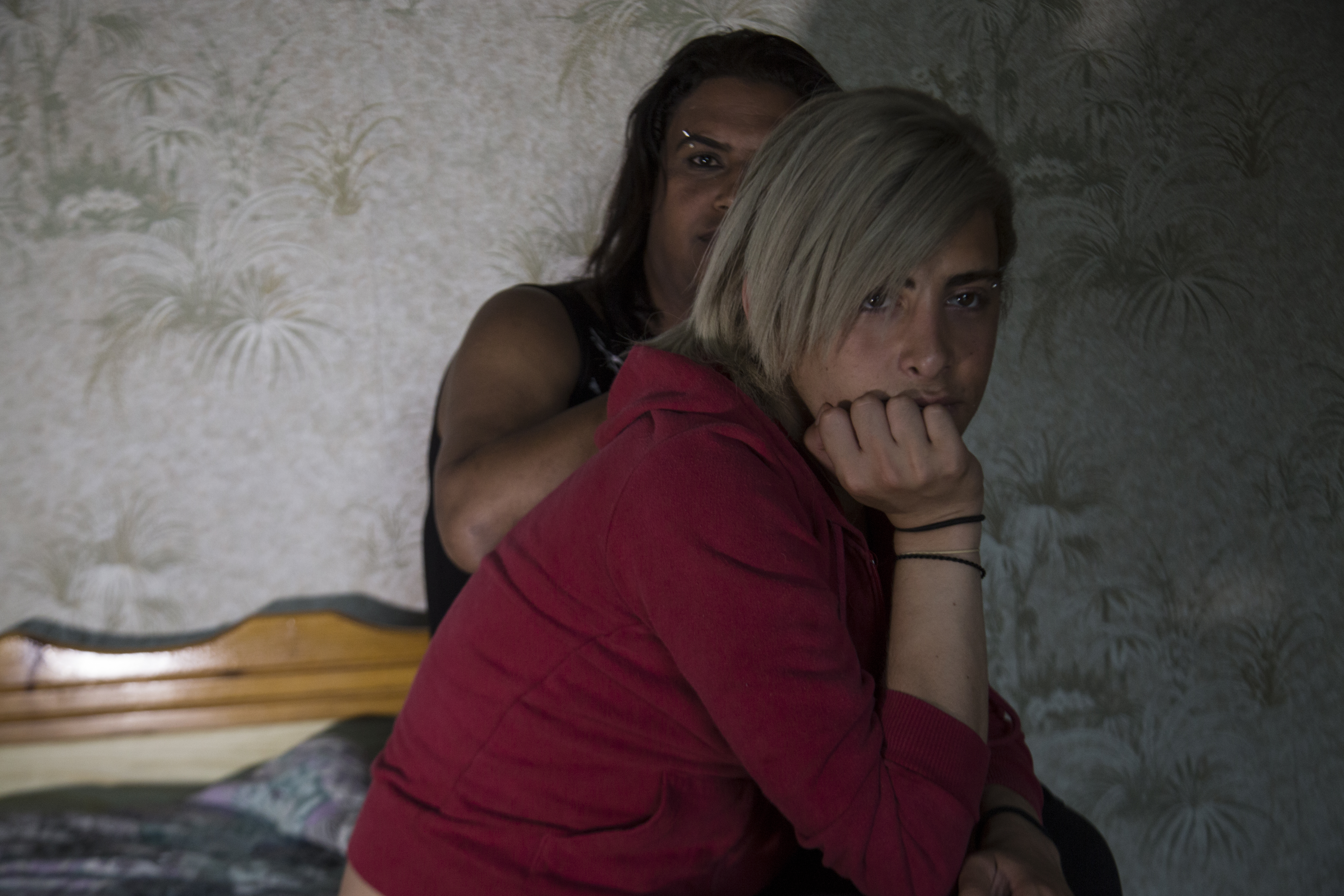
Maher and Hassan look into the camera. Photo: © Alexia Tsagkari
Forged documents
In June, Maher, Hassan, Mahdi and Lara decided they could no longer wait for the asylum process to run its course. It was time to pay a smuggler to get them to Amsterdam. Next to the Saint Nicholas church on Acharnon Street, they met a short, Arabic-speaking man who laid out the options. A basic forged EU passport and a plane ticket would cost them 800 euros each. For 3,000 euros, they could get a high-quality stolen passport and a place on a cruise ship that would take them right around the Mediterranean. The deluxe package even included bribes for coast guard officials, he said. The man showed them photos of fake documents. In the end, they opted for a 1,500-euro deal that would give them a pretty good forged passport — most likely Bulgarian or Romanian — and a flight. They handed over the cash in 50-euro notes, money earned from sex work and given to them by friends living in Kuwait. Towards the end of September, shortly before it was time to travel, tragedy struck. One night, Maher was not herself. She was forgetful, confused and having trouble breathing. Before long, she started bleeding from the mouth.
Hassan called an ambulance. It took forever to arrive, so they piled her into a taxi and sped to the hospital. At first, the doctors would not tell Hassan and Mahdi what was wrong with Maher because they were not relatives. But after two weeks, they revealed she had an intracranial brain tumour and had experienced two strokes. Her condition is inoperable and she is not expected to survive, they said. The tumour may or may not be linked to violence she suffered while in prison in Iraq, the doctors said. As of the time of publication, Maher could hardly speak and did not recognise visitors.
Devastated, Hassan, Mahdi and Lara have no idea what to do next. One evening in late November, Hassan and Mahdi were visiting Maher, whose condition seemed to be deteriorating. Mahdi kept saying under his breath: “What’s next? What’s next?” Hassan sat on the edge of the bed and put his arm around Maher. “Stop asking that, Mahdi,” he said in a small, flat voice. “The important thing is we are together, the three of us.” He raised his cell phone and took a selfie. Just the three of them.
First published on 23 January 2018 on Balkaninsight.com.
This text is protected by copyright: © Alexia Tsagkari. If you are interested in republication, please contact the editorial team.
Copyright information on pictures, graphics and videos are noted directly at the illustrations. Cover picture: Lara, a transgender refugee from Syria, was stabbed in the back by locals near a camp on the Greek island of Leros. Photo: © Alexia Tsagkari.
This article was produced as part of the Balkan Fellowship for Journalistic Excellence, supported by the ERSTE Foundation and Open Society Foundations, in cooperation with the Balkan Investigative Reporting Network.